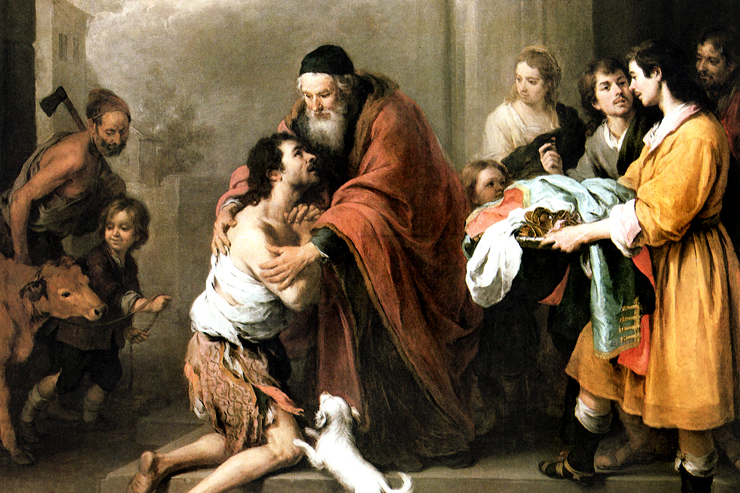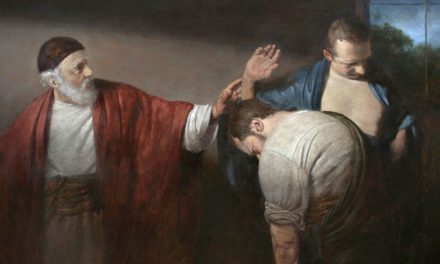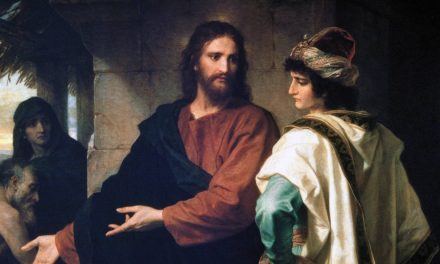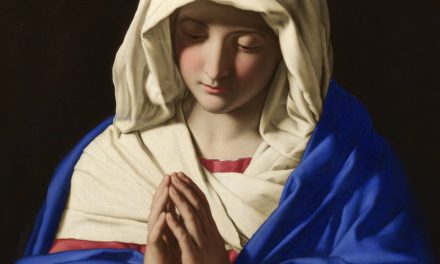Have You Been Saved?
In Acts 4, St. Peter delivers a powerful sermon. He concludes by saying, “There is no salvation through anyone else, nor is there any other name under heaven given to the human race by which we are to be saved.”
I have written before in these pages of the time when I was growing up in the southern part of the United States and how I would from time to time encounter young, protestant teens and adults who would excitedly take to the streets to witness for Christ. Their powerful example was inspiring.
Now for Catholics who may not be familiar with the phrase, “witnessing for Christ”, this was how they would refer to their efforts to evangelize and share their faith in Jesus Christ as personal Lord and Savior.
The conversation would often begin with me being asked, “Do you know Jesus?” or “Have you accepted Jesus as your personal Lord and Savior?” But the conversation would also frequently begin with the question, “Have you been saved?”
What in the world was a young, Catholic boy to make of this?
Of course I knew Jesus. And whether I understood the phraseology of the questions, yes, I knew that Jesus was a person and that I had a relationship with him; I received him in Holy Communion at least weekly; and I prayed to him, spent time with him. I knew he had come to save us and I sure hoped that I would be saved when I passed from this life.
But the questions were still somewhat foreign to me. It seemed as if we had different understandings of the words being used. Inevitably, the discussion would lead to, “Do you know what you must do to be saved?”
The answer, I would be told, was that I must accept Jesus Christ as my personal Lord and Savior and believe in (on) him. Then out came the bibles to prove what was being asserted. Words such as justification, salvation, and believing faith would be tossed back and forth; and occasionally, sanctification.
Prior to third grade, I did not know many Protestants except for the wonderful family members on my father’s side; he was a Southern Baptist, who with my Catholic mother was raising a Catholic family in 1950s Mississippi.
While the state was overwhelmingly Protestant, we lived in a city that was, to my experience, almost totally Catholic, populated with first- and second-generation Irish, French, Slavic and southern European Catholics. My father was able to help me understand where these questions were coming from and to help me form answers true to my Catholic beliefs.
What Does the Catholic Church Teach?
In my ministry as a deacon today, I still hear non-Catholics speak these words and also of “justification” in connection to “being saved.” They know what they believe, but are often confused about what the Catholic Church teaches. So, here is what the Church teach about justification and salvation.
1. Justification is an “act of grace” by God
Justification is wholly the action and work of God to cleanse a person of Original and Personal Sin, restoring him to friendship with God. Original Sin and Personal Sin separated us from that friendship. We could not restore the friendship, but Jesus Christ could and did. Not only is the justified person restored to friendship, he is adopted and made a child of God, a member of the family of God which is his Church. This action (a grace of the Holy Spirit) is merited for us by Christ’s Passion, Death and Resurrection. [cf. CCC 1987 – 1995 and 2017 – 2020]
2. Justification is also a “state of grace”
Justification is the state of being in habitual grace freely given by God to man. This grace that justifies and places one in this state is called sanctifying (or deifying) grace. It is supernatural because it is totally dependent upon God and cannot be earned (initiated) by man. The justified person is said to be in a state of [sanctifying] grace. [cf. CCC 1996 – 1998, 2005, and 2021]
3. Justification must be freely accepted by the human person (free will)
Justification presupposes man’s free act of will to accept and cooperate with this grace. God does not force this action or state on man. Human freedom is a secondary, but, essential element.
It is received by a person’s faith in Jesus Christ through which he freely accepts God’s forgiveness and righteousness. Justification makes possible cooperation between God’s grace and man’s freedom. [cf. CCC 2002 – 2004]
4. Justification transforms the human person
Justification is the beginning of the sanctification of the inner person. Man’s sins are not merely overlooked by God, as Martin Luther taught, rather, the human person is cleansed and by his cooperation with the grace is made truly holy. Through faith in Jesus Christ, man stands in this grace and merits increased (is strengthened in) grace and moves in charity by continued good works (the practice of the human virtues) toward perfection in Christ. Our good works, on our own initiative, do not directly save us, but they can strengthen our relationship with Christ and lead us to grow in holiness. [cf. CCC 1995, 1999, 2006 – 2016]
5. Justification (and thus, Salvation) can be lost
This grace is habitual because it endures and persists until we forfeit it. Man can lose this sanctifying grace by freely and knowingly committing a sin involving grave matter (referred to as being subjectively guilty of a mortal sin). [cf. CCC 1856, 1859, 2000]
The Protestant friends of my youth would tell me that once I was saved, there was nothing I could do, no matter how terribly sinful, that could separate me from God and cause me to lose my salvation. Their belief is the doctrine of some Protestants known as, “Once Saved, Always Saved”. But the New Testament Scriptures are filled with warnings that support the Catholic teaching that salvation can be lost.
St. Paul, writing to believers in 1 Corinthians 9:27 testifies, “…I drive my body and train it, for fear that, after having preached to others, I myself should be disqualified.”
That this speaks to his concern about losing his salvation is made obvious by the passage that immediately follows in 1 Corinthians 10 where he warns believers about giving in to sin and human confidence. In verses 12 and 13 he writes, “Therefore, whoever thinks he is standing secure should take care not to fall. No trial has come to you but what is human. God is faithful and will not let you be tried beyond your strength; but with the trial he will also provide a way out, so that you may be able to bear it.”
If this is not enough to convince us, he writes to the believing Gentile Christians in Romans 11:17-21, “But if some of the branches were broken off, and you, a wild olive shoot, were grafted in their place and have come to share in the rich root of the olive tree, do not boast against the branches. If you do boast, consider that you do not support the root; the root supports you. Indeed you will say, ‘Branches were broken off so that I might be grafted in.’ That is so. They were broken off because of unbelief, but you are there because of faith. So do not become haughty, but stand in awe. For if God did not spare the natural branches, he will not spare you either.”
Thus, St. Paul teaches us in Philippians 2:12-13, “So then, my beloved, obedient as you have always been, not only when I am present but all the more now when I am absent, work out your salvation with fear and trembling. For God is the one who, for his good purpose, works in you both to desire and to work.”
6. Justification is initially received at Baptism
It is initially received at [the Sacrament of] Baptism.
This marks the beginning (not the end) of a person’s conversion and sanctification, man’s free response to the invitation to the Divine life from God where he turns from sin and toward God. Should a person lose the [sanctifying] grace of justification, it can be restored through sacramental confession (Sacrament of Reconciliation). [cf. CCC 1856, 1992, 2020]
7. So, how does Justification relate to Salvation?
The answer is so simple we often overlook it, so do not look for a long answer here.
The justified person attains salvation if he dies in a state of Sanctifying Grace.
So, have you been saved?
“Yes, I believe in Jesus and received his justifying (sanctifying) grace when I was baptized into his Church. Jesus saved me. And at those times when I have sinned gravely and lost this grace, I returned to the Lord to be cleansed again by him in the Sacrament of Reconciliation (Confession) where I again received his justifying grace.
“I am strengthened in my personal relationship with him by my worship of him and receiving him in Holy Communion at Mass; through my prayer, devotion and reading of the Scriptures; by my study of the teachings of the faith; and through my good works prepared beforehand by him for me to perform while in his grace.
“I have been saved, am being saved, and have supernatural hope that I will be saved. I believe this because the Church, established by Jesus, through which this grace flows to me, teaches me that this is so.”
Into the deep…
Deacon Bickerstaff is available to speak at your parish or event. Be sure to check out his Speaker Page to learn more. Into the Deep is a regular feature of the The Integrated Catholic Life™.
Come and Join me on Twitter!
















